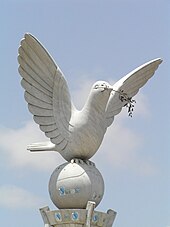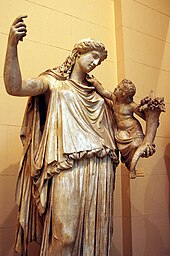
Back Vrede AF Frieden ALS Paz AN शांति ANP سلام Arabic ܫܠܡܐ (ܫܝܢܐ) ARC سلام ARY سلام ARZ Paz AST Sülh AZ
This article's lead section may be too short to adequately summarize the key points. (December 2024) |


Peace is a state of harmony in the absence of hostility and violence. In a societal sense, peace is commonly used to mean a lack of conflict (such as war) and freedom from fear of violence between individuals or groups.
"Psychological peace" (such as peaceful thinking and emotions) is less well-defined, yet perhaps[further explanation needed] a necessary precursor to establishing "behavioural peace". Peaceful behaviour sometimes results from a "peaceful inner disposition". It has been argued by some that inner qualities such as tranquility, patience, respect, compassion, kindness, self-control, courage, moderation, forgiveness, equanimity, and the ability to see the big picture can promote peace within an individual, regardless of the external circumstances of their life.[2]
- ^
- "UN Logo and Flag". United Nations. Archived from the original on 26 December 2020. Retrieved 10 December 2020.
- "International Day of Peace 2020 Poster" (PDF). UN.org. United Nations. Archived from the original (PDF) on 24 September 2020. Retrieved 10 December 2020.
- ^ Galtung, Johan (31 July 1996). Peace by Peaceful Means: Peace and Conflict, Development and Civilization (1st ed.). Los Angeles: SAGE Publications Ltd. ISBN 978-0-8039-7511-8.